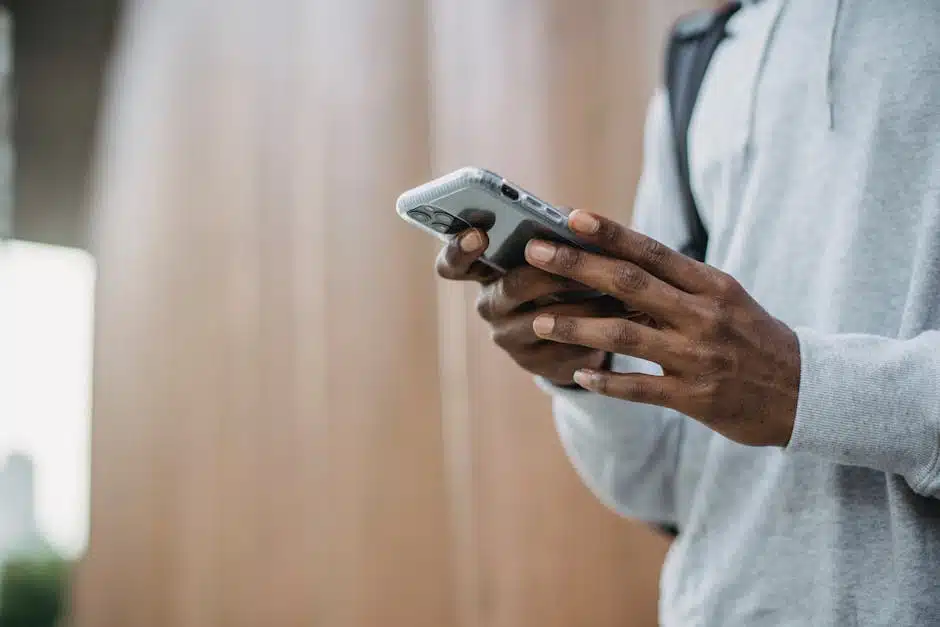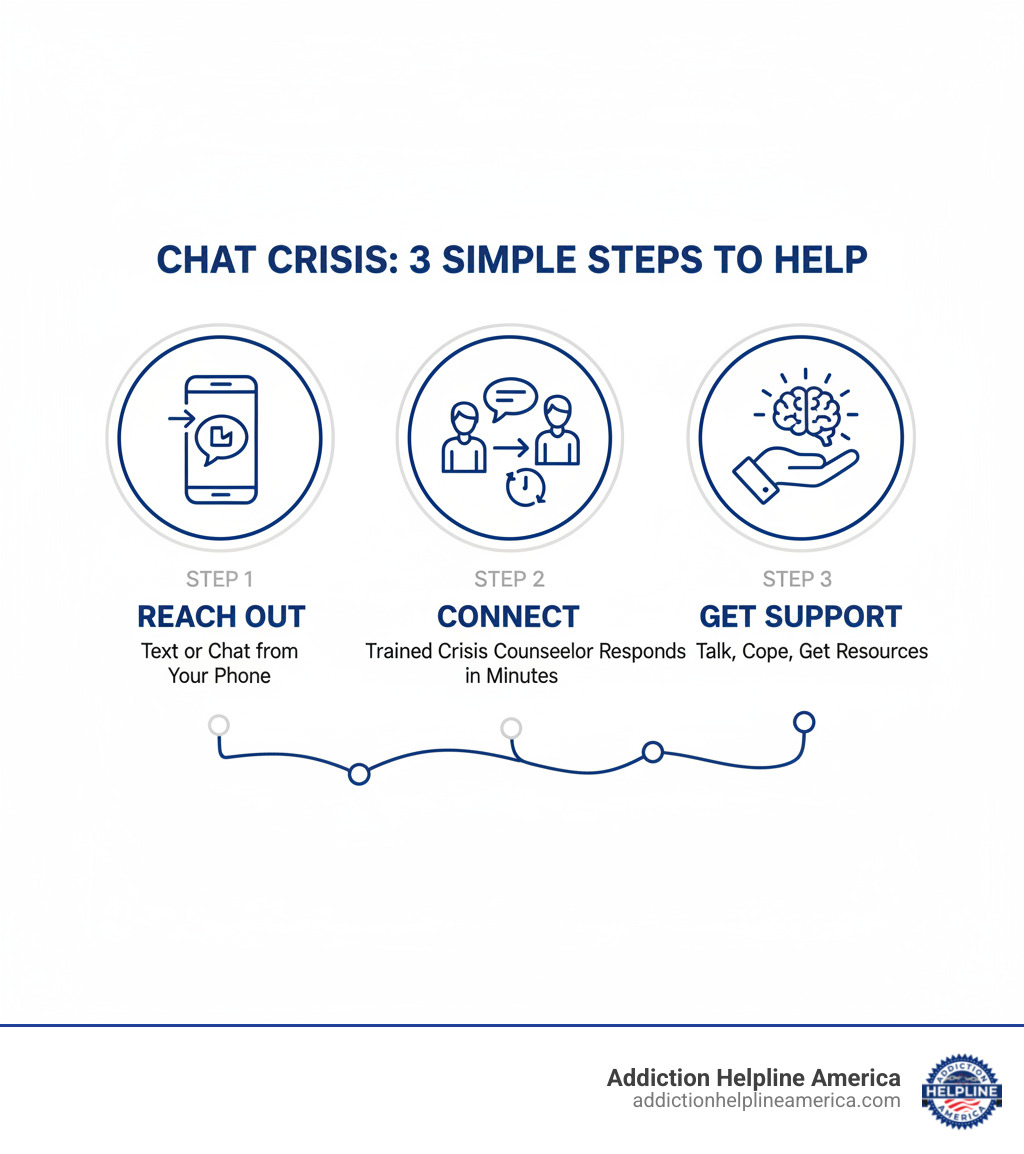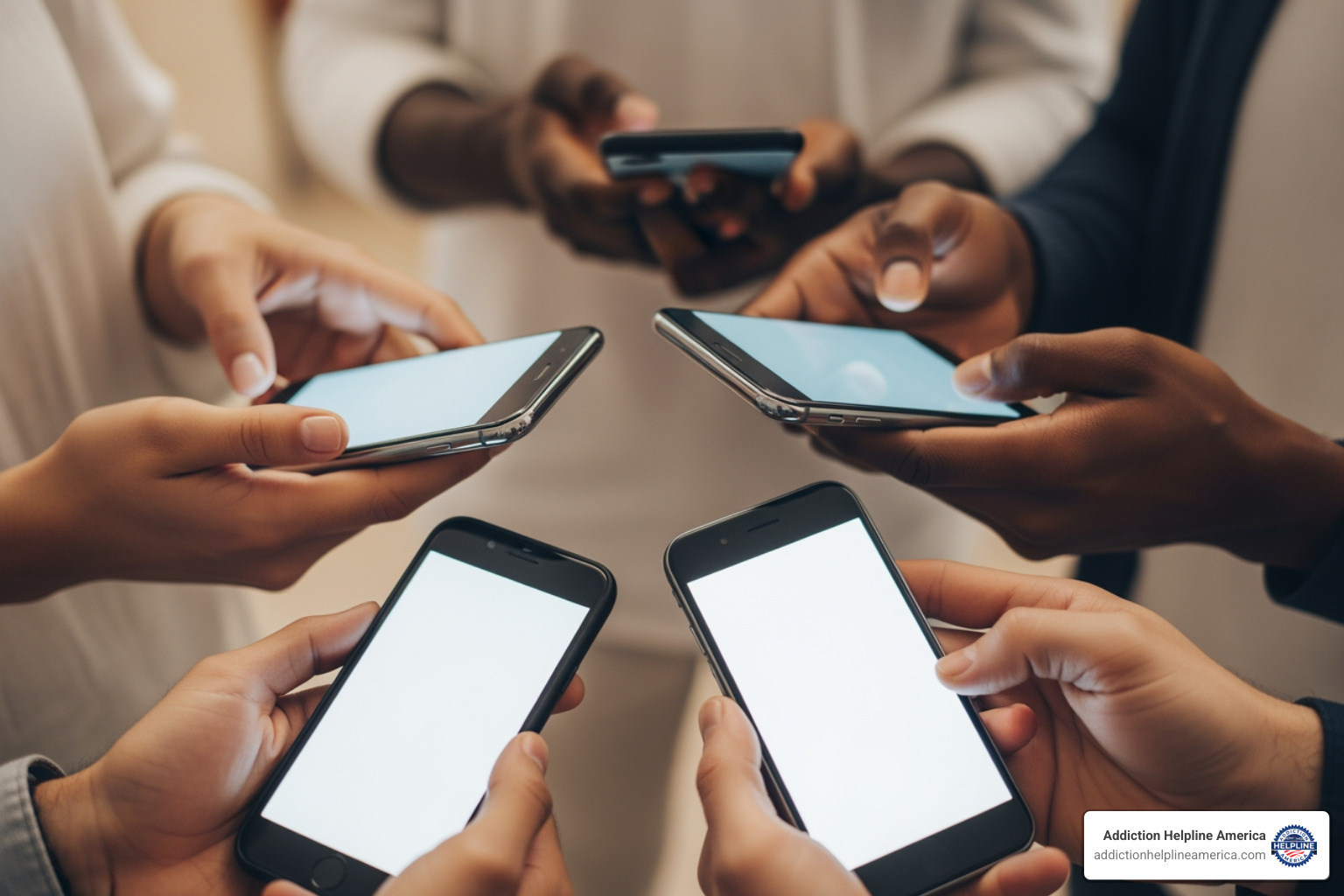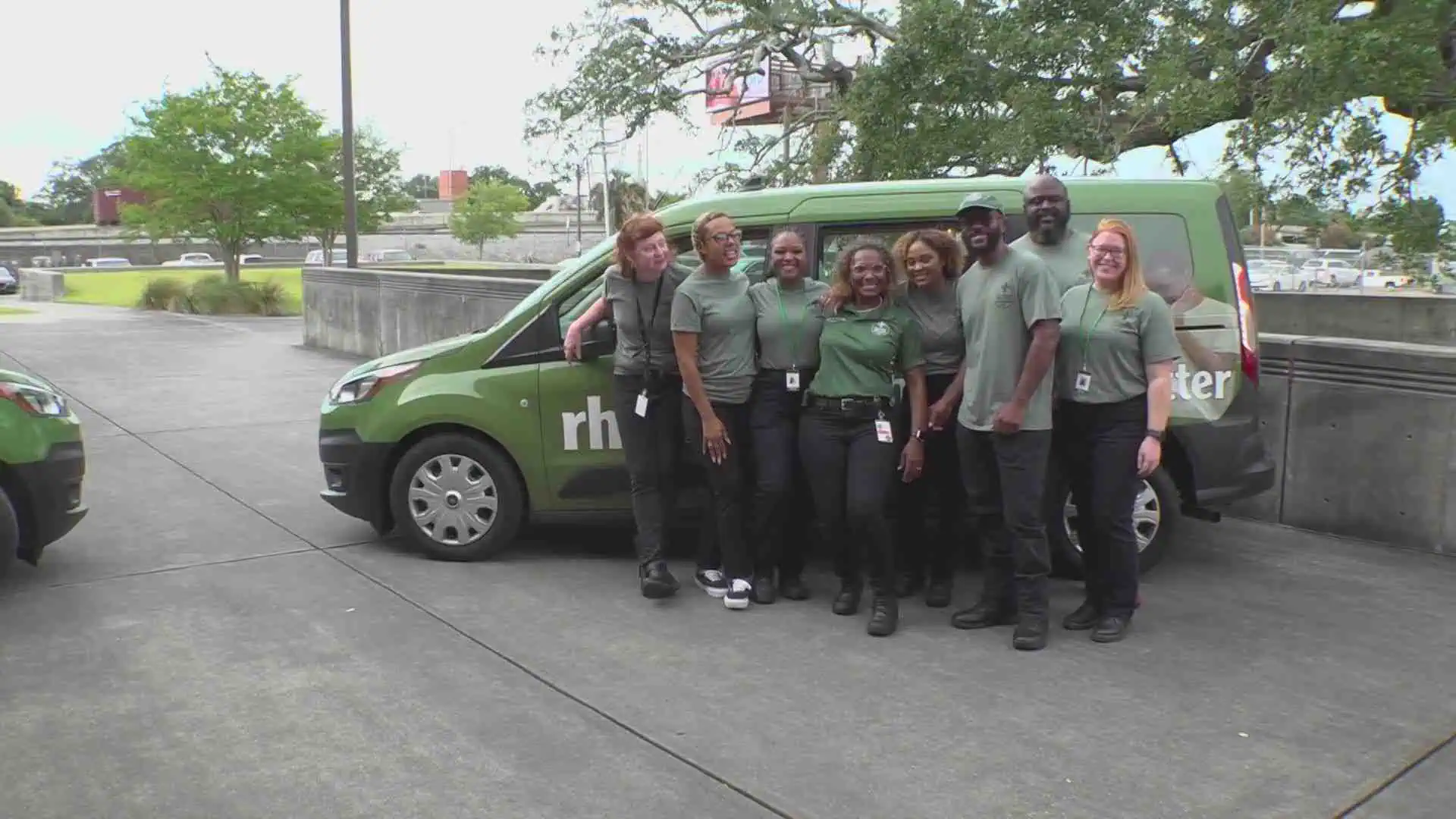
Why Immediate Support Matters in a Crisis
Chat crise (crisis chat) services provide immediate, confidential support through text-based platforms when you or someone you care about is experiencing a mental health or addiction-related emergency. Here’s what you need to know:
Quick Overview of Crisis Chat Services:
- Available 24/7/365 – Connect with a trained counselor any time, day or night
- 100% Free and Confidential – No cost, no insurance needed, no personal information required
- Multiple Ways to Connect – Text, web chat, or WhatsApp depending on the service
- Immediate Human Support – Real trained counselors, not bots, respond within minutes
- No Crisis Too Small – You don’t need to be suicidal to reach out; any emotional distress qualifies
When you’re in the grip of addiction or watching a loved one struggle, the emotional weight can feel unbearable. Connecting with a counselor through a simple text message can make a profound difference. Many users report feeling a positive change in mood after a conversation, showing the power of immediate, accessible support.
Crisis chat services work because they meet you where you are—literally. You don’t need to make a phone call or leave your home. A trained volunteer or professional counselor receives your message and responds with empathy, active listening, and practical coping strategies to help you move from a moment of intense crisis to a calmer state.
At Addiction Helpline America, we’ve spent years connecting individuals and families affected by substance abuse with vital crisis chat resources. Our team knows that when someone reaches out for help, having a trained professional respond within minutes can change the entire trajectory of their crisis.
Easy chat crise word list:
What is a Chat Crise Service and How Does It Work?
A chat crise service is a digital safe space where you can connect with a trained counselor through text or web chat. There are no appointments, waiting rooms, or judgment—just real human support for crisis intervention and emotional support when you need it most.
These services use familiar platforms like SMS text messaging, web chat, or even WhatsApp. Behind every conversation is a trained professional or a dedicated volunteer who has completed extensive training in active listening and providing compassionate support. They are real people, not bots, trained to help you through difficult moments.
Core Services Offered During a Crisis Chat
When you reach out, you connect with a structured support system designed to help you move from a “hot moment” to a “cool calm.” Counselors practice active listening, creating a space where you can express yourself freely. They use de-escalation techniques, like guided breathing, to help you calm down if you’re feeling overwhelmed.
The process is one of collaborative problem-solving. The counselor works with you to identify triggers and brainstorm coping strategies. If thoughts of self-harm arise, they are trained in safety planning to help you develop a plan to stay safe.
Finally, a key service is resource connection. Your counselor can point you toward local treatment centers, support groups, or specialized helplines. At Addiction Helpline America, we excel at helping you steer treatment options. You can explore more info about mental health support from Addiction Helpline America to see the range of resources available.
Ensuring Confidentiality and Accessibility in a Chat Crise
Confidentiality and accessibility are the cornerstones of crisis chat services. Here’s what you can expect:
- Privacy and Anonymity: Reputable services have strict privacy policies. You don’t have to share your name or any identifying information. Your conversation is protected.
- Free of Charge: These services are always free. You don’t need insurance or a credit card.
- 24/7/365 Access: Counselors are available around the clock because crises don’t keep business hours.
- No Enrollment Required: If you’re in crisis, you can reach out. It’s that simple.
While your privacy is sacred, counselors have a “duty to report” in rare situations. If there is an imminent danger of harm to yourself or others, or if child abuse is suspected, they may need to contact emergency services. This “active rescue” protocol exists solely to keep you safe.
Text vs. Voice: Choosing the Right Support Channel
When you’re struggling, the way you reach out can matter. Some people prefer typing their thoughts, while others need to hear a compassionate voice. There’s no wrong choice—only the one that works best for you. Personal preference is everything; the channel that feels most comfortable is the one most likely to help.
| Feature | Text-Based Support | Voice-Based Support |
|---|---|---|
| Anonymity | High (can feel more anonymous, allows for privacy in public) | Moderate (voice can be recognized, may require private space) |
| Speed | Slower (typing, processing responses) | Faster (real-time conversation, immediate feedback) |
| Emotional Nuance | Lower (relies on words, emojis, can lead to misinterpretation) | Higher (tone of voice, inflection, pace convey emotion) |
| Convenience | High (can be done anywhere discreetly, no need for quiet space, can pause/resume) | Moderate (requires dedicated, often private, space and time) |
| Accessibility | High (beneficial for hearing-impaired, non-verbal, or those who prefer writing) | Moderate (may be challenging for hearing-impaired, can be intimidating for some) |
| Record Keeping | Automatic (written transcript available for review) | None (unless recorded, which is rare and usually requires consent) |
Benefits and Limitations of Text-Based Support
Text-based support, the core of most chat crise services, offers significant advantages. The anonymity can make it easier to be honest, and the privacy in public means you can get help discreetly from anywhere. Texting also gives you time to process your thoughts and provides a written record of coping strategies. For individuals who are deaf, hard of hearing, or non-verbal, these services are essential.
However, text has limitations. The slower pace can be frustrating in an urgent crisis, and the potential for misinterpretation is higher without vocal tone. For some, the lack of vocal tone is a major drawback, as they need to hear the warmth in a counselor’s voice.
Benefits and Limitations of Voice-Based Support
Voice-based support offers immediate feedback and a powerful emotional connection through tone. A counselor’s calm voice can be grounding, and communication is often faster. This can help you feel heard and understood more quickly.
The downsides include the need for a private space, which isn’t always available. Phone calls can also be intimidating for some, and there is less anonymity than with text, which can make some people feel more exposed.
At Addiction Helpline America, we understand that different moments call for different approaches. That’s why we help connect you with services that offer both text and voice options, so you can choose whatever feels right when you need support most.
Finding the Right Chat Crise Support for Your Needs
Finding the right chat crise service isn’t a one-size-fits-all situation. The good news is there is a variety of specialized support available for different communities and situations.
At Addiction Helpline America, we’ve spent years helping people find the right match for their needs. We know that when you’re in crisis, you don’t want to waste energy searching. Understanding what’s out there can make all the difference.
Specialized Support for Different Communities
Crisis support has evolved to recognize that different communities face unique challenges. When counselors understand your background, they can offer more relevant support.
- Youth-focused services create a safe space where counselors understand the pressures of being a young person today. Some services specifically serve LGBTQ+ young people, offering support from counselors trained in issues related to sexual orientation and gender identity.
- Family members and loved ones also need support. The Veterans Crisis Line extends its support to families, and other helplines provide resources specifically for caregivers. If you’re supporting someone battling addiction, we’ve gathered comprehensive Resources for Families of Addicts.
- Language accessibility is crucial. The 988 Lifeline offers text and chat services in Spanish, ensuring language isn’t a barrier. Some services also provide Spanish language options via text.
- Rural communities particularly benefit from text and chat services. When the nearest mental health professional is far away, confidential support on your phone can be life-changing.
For comprehensive guidance, you can Find a verified helpline for your needs through our directory.
How to Find the Best Chat Crise Service for You
Finding the right fit can make your experience much more helpful. Here are a few tips:
- Assess your needs. Are you struggling with anxiety, substance use, or supporting a family member? Knowing your primary challenge helps narrow the options.
- Consider your communication style. Do you prefer the anonymity of text or the immediate connection of a voice call?
- Look for specialized services. If you’re part of a specific community (like a veteran or an LGBTQ+ youth), a service designed for you may feel more understanding.
- Read about the service. A quick look at a service’s website can tell you if it aligns with your needs.
- Don’t be afraid to try another service. If the first one doesn’t click, it’s okay to reach out to a different one. Finding the right support is worth the effort.
The Technology and People Behind 24/7 Crisis Support
Running a 24/7 chat crise service requires a remarkable combination of committed people and sophisticated technology. The backbone of many of these services is an army of trained volunteers.
These volunteers undergo extensive training in crisis intervention and commit to regular weekly shifts. This model, supported by professional staff, is what makes round-the-clock availability possible. Most chat crise services operate as non-profits, relying on donations and grants to train volunteers, maintain technology, and expand their reach.
The technology infrastructure is designed for security and reliability. When you send a message, it’s securely routed to an available counselor while protecting your privacy. Services often use familiar platforms like WhatsApp or SMS because they are accessible and reliable. The technology is simply the bridge that connects you to a compassionate human being.
One of the most critical aspects is emergency escalation protocols. If a counselor believes you are in imminent danger, they have a duty to report and may initiate an “active rescue” by contacting emergency services like 911. This is a rare last resort, taken only to ensure your safety.
At Addiction Helpline America, our chat service is designed for information and guidance. If you’re in immediate danger, we will always direct you to call 911 or text 988 for the fastest emergency help.
Data shows these services are highly effective. The vast majority of users report finding the conversations helpful and experiencing a positive change in mood. Services continuously collect user feedback and analyze data to improve their effectiveness, ensuring that support gets better with each conversation.
What If I’m Not Ready to Talk? Other Ways to Get Help
We understand that reaching out isn’t always easy. Sometimes you need time to process your feelings first. That’s okay. There are still meaningful ways to help yourself right now, even without having a conversation.
Think of these resources as stepping stones. They can help you calm down, understand what you’re experiencing, and build the confidence to reach out when you’re ready.
-
Guided breathing exercises are surprisingly powerful for anxiety. Focusing on your breath for just a minute can help reset your nervous system. Many crisis support websites offer simple, guided exercises you can do anywhere.
-
Online mental health screening tools can be a helpful starting point. While they don’t provide a diagnosis, they can help you identify patterns in your symptoms and give you language to describe what you’re feeling. These tools are usually quick, confidential, and available on many crisis support websites.
-
Informational knowledge centers from major mental health organizations offer comprehensive, easy-to-understand information about conditions, treatments, and coping strategies. Reading these resources can help you feel less alone and more informed.
-
Peer support forums provide spaces where people share their experiences. You can read others’ stories, ask questions anonymously, or simply find comfort in knowing that others have walked similar paths.
-
Downloadable crisis guides offer step-by-step information for what to do during a mental health crisis. Having this information before a crisis hits can make a difference when clear thinking is difficult.
If you’re dealing with intense emotions related to substance use, understanding your options is crucial. We’ve put together detailed information about emotional breakdown treatment that can help you recognize when you’re in severe distress.
Using these self-help resources is an active step in managing your well-being at your own pace. When you’re ready to talk, chat crise services will be there to support you.
How You Can Support Crisis Intervention Organizations
Behind every chat crise conversation that helps someone move from despair to hope, there’s an entire support system of volunteers, donors, and advocates. These services save lives, but they can only continue their vital work with public support.
Become a Volunteer Crisis Counselor
If you want to make a direct impact, consider volunteering. Crisis service organizations actively recruit compassionate individuals to become trained counselors. The volunteer training process is comprehensive, preparing you with skills in active listening, de-escalation, and safety planning. You don’t need to be a mental health professional; you just need empathy and a genuine desire to help.
Make a Financial Contribution
These services are free for users, which means they depend on donations to keep their lines open 24/7. Financial support funds the technology, trains volunteers, and ensures that when someone reaches out for help, someone is there to respond. Even small contributions to non-profit organizations in this field can make a big difference.
Spread Awareness and Break the Stigma
Sometimes the most powerful thing you can do costs nothing. Sharing information about crisis chat services on social media or talking openly about mental health helps break down the stigma that prevents people from seeking help. When you share a post about chat crise services, you create a culture where asking for support is seen as a sign of strength.
At Addiction Helpline America, we’ve seen how awareness changes outcomes. The more people know about available resources, the faster they can get help.
Your Impact is Real
Whether you give your time, resources, or voice, you become part of a lifesaving network. Every volunteer hour, every dollar donated, and every conversation about mental health makes it easier for the next person to ask for help.
Frequently Asked Questions about Crisis Chat
It’s natural to have questions before reaching out to a chat crise service. Here are answers to some of the most common ones.
Are crisis chat services really free and confidential?
Yes, they are completely free and confidential. You will not be billed, and you do not need insurance. Reputable services follow strict privacy policies to protect your information.
The only exception to confidentiality is when there is an imminent risk of harm. If you are in immediate danger of harming yourself or someone else, or if child abuse is suspected, counselors have a “duty to report.” In these rare cases, they may contact emergency services to ensure safety. This is a safety measure, and the counselor will typically try to work with you through the process.
What happens if I’m in immediate danger?
If you are in a life-threatening situation, a crisis counselor will follow specific safety protocols. They will assess the danger and may work with you to ensure you get immediate help. In cases of clear and present danger, the counselor may initiate an “active rescue” by contacting emergency services (like 911) on your behalf.
This is a rare intervention taken solely for your well-being. If you know you are in immediate danger, you should call 911 directly or text the 988 Suicide & Crisis Lifeline. Our chat at Addiction Helpline America is for guidance, and we will always direct you to emergency resources in an acute crisis.
Do I have to be suicidal to use a crisis chat?
Absolutely not. This is one of the biggest myths about crisis services. You can reach out for any reason. Whether you’re feeling overwhelmed by stress, struggling with loneliness, worried about substance use, or just having a hard day, you deserve support.
The 988 Lifeline and other services welcome people experiencing any kind of emotional distress. Think of crisis chat as a bridge to help you feel less alone and gain clarity. The bottom line is: if something is bothering you enough that you’re thinking about reaching out, that’s reason enough.
Conclusion
Taking that first step to reach out during a crisis—whether you’re battling overwhelming emotions, struggling with addiction, or watching someone you love suffer—is one of the bravest things you can do. We’ve seen it time and again: the moment someone decides they don’t have to face their pain alone, everything can begin to shift.
Chat crise services and crisis helplines exist because you matter. Your struggle matters. And you absolutely do not have to steer these dark moments by yourself. Right now, at this very moment, trained counselors are standing by through text, chat, and phone lines, ready to listen without judgment, help you calm the storm, and connect you to resources that can truly make a difference. Whether it’s 3 AM on a Tuesday or the middle of a holiday weekend, someone is there—24/7, 365 days a year—waiting to support you.
The beautiful thing about these services is their simplicity. You don’t need insurance, you don’t need money, you don’t even need to share your name if you’re not comfortable. You just need to reach out. That single text message or chat conversation can be the turning point that moves you from crisis to hope, from isolation to connection.
At Addiction Helpline America, connecting people to life-changing support isn’t just what we do—it’s why we exist. We’ve dedicated ourselves to understanding the complex landscape of addiction and mental health recovery because we know how confusing and overwhelming it can feel when you’re in the middle of it. We’re not here to judge your story or tell you there’s only one path forward. We’re here to listen, to understand your unique situation, and to help you find the right resources that fit your needs and circumstances.
Whether you’re seeking immediate crisis support, exploring treatment options for substance use, or looking for guidance on how to help a family member, we have the expertise and the network to point you in the right direction. Our team knows the questions to ask, the resources that truly deliver on their promises, and how to match you with programs that align with your goals for recovery.
Your journey toward healing can start today. Take that courageous step and find the right support for you by exploring our addiction and rehab hotlines. You deserve support. You deserve hope. And you deserve to know that better days are absolutely possible.
Our helpline is 100%
free & confidential
If you or someone you care about is struggling with drug or alcohol addiction, we can help you explore your recovery options. Don’t face this challenge alone—seek support from us.
Programs
Resources
Will my insurance
cover addiction
treatment?
We're ready to help
Find the best
drug or alcohol treatment
center
Are you or a loved one struggling with addiction? Call today to speak to a treatment expert.








